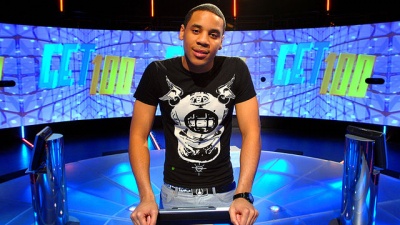Get 100
| Line 25: | Line 25: | ||
To begin, one of the four contestants is picked at random. They then pick one of Reggie's question cards and is asked the question on it. They get ten seconds thinking time. If they're wrong, the question bounces to the next contestant who gets another ten seconds and so on until someone gets it right or everybody's had a go, in which case the question is thrown out and the game continues. | To begin, one of the four contestants is picked at random. They then pick one of Reggie's question cards and is asked the question on it. They get ten seconds thinking time. If they're wrong, the question bounces to the next contestant who gets another ten seconds and so on until someone gets it right or everybody's had a go, in which case the question is thrown out and the game continues. | ||
| + | |||
| + | <div class="image">[[Image:Get 100 reggie yates.jpg|400px]]''Reggie Yates, the man with more numbers than the Birmingham phone book''</div> | ||
When someone gets a question right, they earn the same number of points as the answer to the question. They then have four options: | When someone gets a question right, they earn the same number of points as the answer to the question. They then have four options: | ||
Revision as of 22:23, 7 December 2008
Contents |
Host
Reggie Yates (2007)
Hardeep Singh Kohli (2008)
Co-host
Dave Chapman (voiceover, 2007)
Broadcast
BBC Scotland for CBBC on BBC Two / CBBC on BBC One / CBBC Channel, 16 April 2007-
Synopsis
This is quite an interesting oddity, it appears to be an attempt at making maths hip for ver kids.
Four contestants sit in the round in the middle of a sunken stage (excuse for overhead camera shot ahoy!), with the audience sat above them looking down. The walls of the pit are all videoised.
There are twelve pre-determined questions on twelve cards, the correct answer to each one is a number between 1 and 99. the questions require applied mental arithmetic, not unlike the sort of thing you'd get on Round One of Winning Lines and some have videos and music to accompany them (for example, they'll show a tennis clip and ask what you get if you multiply the number of letters in "court" with the number of letters in "Wimbledon" - 45, obviously).
To begin, one of the four contestants is picked at random. They then pick one of Reggie's question cards and is asked the question on it. They get ten seconds thinking time. If they're wrong, the question bounces to the next contestant who gets another ten seconds and so on until someone gets it right or everybody's had a go, in which case the question is thrown out and the game continues.
When someone gets a question right, they earn the same number of points as the answer to the question. They then have four options:
- They can keep the points for themselves.
- They can take the points away from themselves.
- They can give the points to another player.
- They can take the points away from another player (but only if the other player has enough to take away).
The object of the game is to try and hit 100 points on the nose - doing this wins you a shedload of prizes. That's quite unlikely, so to win the game your score needs to be closest to 100 after the twelfth question - that earns you an MP3 player and a place in the Friday final (ties broken by educated guess tiebreaker). The order of play is constant, after a question is correctly answered the next person in line gets first crack at the next one.
What's quite interesting about the show is that it seems to be professing strategy from the rooftops, but really there's so much out of your hands (the nature of the numbers in the questions, other people) it may as well be a game of luck. It's also, no matter how hard it tries, a bit less fun than we think it wants to be, despite the best efforts of host Reggie Yates who acts somewhere between Michael Underwood and Richard Blackwood.
The second series featured a new host (professional Glaswegian Hardeep Singh Kohli), no Dave Chapman, a lot of chatter with the contestants, and fewer video clips. It was shown as self-contained episodes, with the winner of each game taking something from the Prize Pod. The net effect was a little less fun than the first series had been.
Catchphrases
"It's the right aaaaaaansah!"
Theme music
Marc Sylvan
Devisor
Format by TBS.



